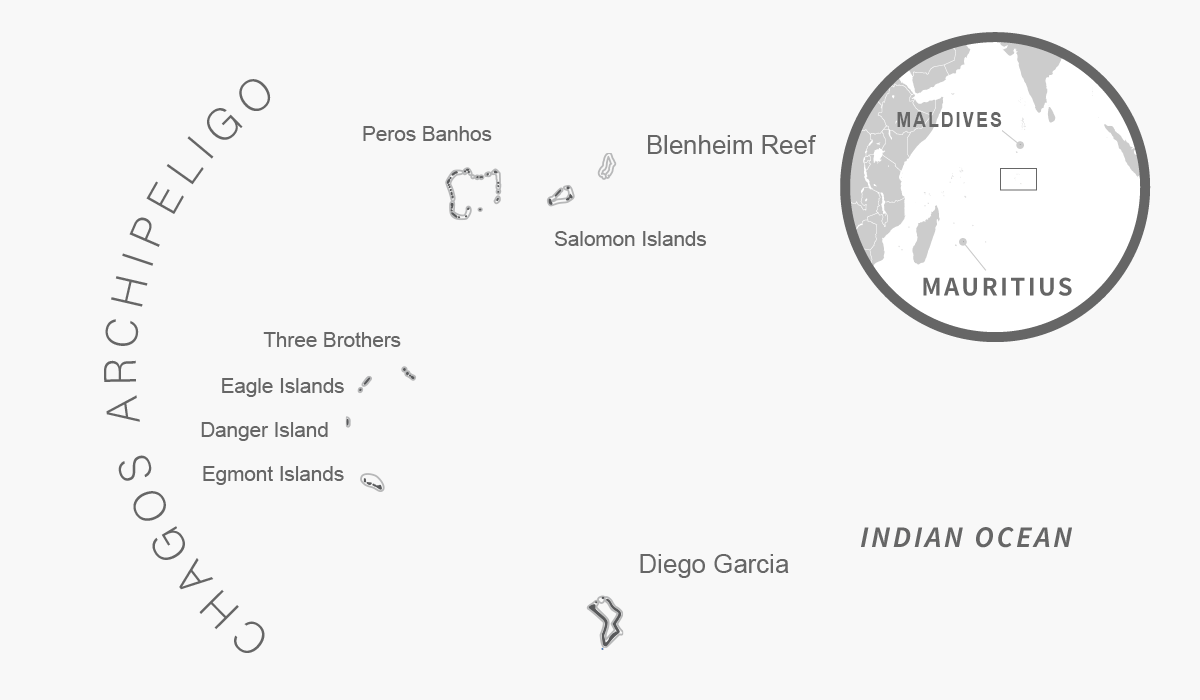
KATE O’SHAUGHNESSY
The UK government announced last week that it will cede sovereignty of the Chagos archipelago to Mauritius. The agreement ends an almost 60-year dispute between the two countries, allowing Chagossians displaced in the early 1970s to return home, and ensuring the continued operation for the next 99 years of the US military base on Diego Garcia (one of the islands in the archipelago).
But concluding this deal likely won’t reverse declining support for the international rules-based order, especially across Africa. And for those countries who want more and better multilateralism – like Australia – there’s important lessons to be learned from how the Chagos dispute played out, and now in watching early reactions to the deal, especially in the “Global South”.
The dispute over this little-known archipelago goes to the heart of efforts to maintain strategic stability in the Indian Ocean.
At the height of the Cold War in 1965, the UK detached Chagos from its then-colony of Mauritius, three years before Mauritius gained its independence. The United Kingdom renamed the archipelago the British Indian Ocean Territory, forcibly removed Chagos islanders to Mauritius and Seychelles, and leased the island of Diego Garcia to the United States in return for a US$14 million discount on Polaris nuclear missiles.
In the years ahead, Diego Garcia became a critically important US military asset – essential for power projection into the Indian Ocean and a staging point for operations in the Middle East including Afghanistan and Iraq after 9/11. With the establishment of a Chinese military base in Djibouti in 2016 and increasing Chinese presence in the Indian Ocean, the significance of Diego Garcia has only grown.

But every Mauritian prime minister since independence has argued that the archipelago belongs to Mauritius. Most vocal has been current Mauritian Prime Minister Pravind Jugnauth, who established a dedicated Chagos unit within his office, and obtained an advisory opinion in 2019 from the International Court of Justice, calling for the United Kingdom to return Chagos to Mauritius as quickly as possible. Overwhelming endorsements for Mauritian sovereignty soon followed in multilateral bodies including the UN General Assembly, the International Tribunal for the Law of the Sea, and the Universal Postal Union, with just five countries throwing their support behind the United Kingdom – the United States, Israel, Australia, Maldives, and Hungary.
And what can we learn from how the dispute was resolved?
That weight of international opprobrium was what – ultimately – forced the UK’s hand. It tried compensation (announcing in 2016 a GBP40 million package of support for displaced Chagossians), legal technicalities (arguing the ICJ’s opinion was advisory and non-binding), and hard-nosed strategic realism (it’s hard to imagine a secure Indian Ocean without the US military base at Diego Garcia). But in the end, none of these efforts could counteract a widespread global narrative that the United Kingdom (and supporters such as the United States and Australia) only adhered to the rules-based order when it suited them.
That’s a refrain that in recent years British, Australian and American diplomats based in Port Louis heard repeatedly, not only from Mauritian counterparts, but from non-aligned countries such as India (a strong supporter of Mauritius’ claims), and of course China. “You tell others to respect the rules-based order, but you don’t comply yourself.”
Grass roots Mauritian reactions have been mixed with social media commentators accusing the Prime Minister of selling out.
The new deal, in theory, takes the oxygen out of those arguments. But there’ll be one sticking point – the United Kingdom is authorised to exercise Mauritius’ sovereignty in Diego Garcia for an “initial period of 99 year,” a crucial element of the agreement that enables certainty for the US base.
In his address to the nation on 3 October, Jugnauth said that “many people doubted that a small country like ours could get justice, against a major power like the UK. But guided by our convictions, we finished the decolonisation of our republic.”
But grass roots Mauritian reactions have been mixed with social media commentators accusing the Prime Minister of selling out: “What kind of a deal is this when Diego Garcia remains US property for at least 99 more years???” asked one commenter. Another saw the deal as a betrayal of non-aligned principles: “What about relations with emerging powers like China and India? These nations, which have supported Mauritius in its quest for sovereignty, may well see this agreement as a betrayal, a de facto alignment with Western interests.”
Regionally, the African Union and India have come out strongly in favour of the deal. Still, it’s worth remaining attune to the possibility that over time, some countries (especially China) may paint the deal as just another example of Western countries gaming the system to suit themselves. Countries such as China and Russia will certainly seek to leverage local discontent in Mauritius.
The UK-Mauritius accord is in fact a good deal, for everyone. It’s the result of years of Mauritian advocacy in the international system, and thoughtful British diplomacy. It compensates Chagossians for historic injustice and trauma. It gives the US military base certainty at a time when that is needed more than ever. And it demonstrates that the rules-based order can work for small states, just as much as for the major powers. But the result won’t on its own counteract deep-seated discontent across the Global South with the rules-based order – that’s a much longer game.
source : lowyinstitute
